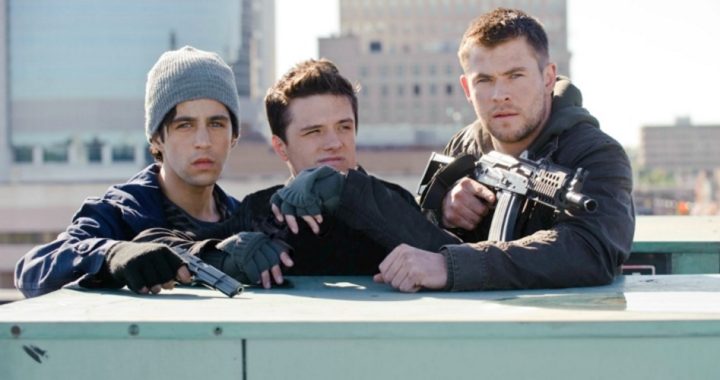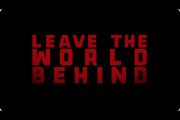
Spokane, Washington, is the target of an invasion of parachute troops from North Korea in this remake of the 1984 John Milius-directed film Red Dawn. A rag-tag team of teenage guerrillas escapes to the woods and trains to become a “tiny flea that can drive a big dog crazy,” as proposed by the team’s leader, Jed Eckert (Chris Hemsworth).
The main theme is the decision that each member of the team must make on his or her own regarding the fight: whether or not to get involved and fight for home, family, and country. A sub-theme is the reconciliation of Jed with his younger brother Matt (Josh Peck) who finally resolve their differences under the pressure of increasing resistance by the enemy.
Underlying it all is resistance to tyranny.
Many of the action sequences are lifted from the original film including the ambush scene where one of the team members, Toni (Adrianne Palicki), baits some soldiers into chasing her around the corner of a building. They are met and gunned down by other team members who then ransack the bodies for their weapons and ammunition, giving them the additional firepower they desperately need to become the irritating flea on the back of the North Korean troops.
There is frequent reference to why such resistance, at the potential cost of their lives, is needed from the members. As Jed explained:
When you’re fighting in your own backyard, when you’re fighting for your family, it all hurts a little and makes a little more sense.
That’s our biggest advantage. For them, this is just a place.
For us, this is our home.
As the film develops, the resistance by the Wolverines encourages those in town not already rotting in a POW camp to join them.
Along the way, there were moments of clarity, and moments of incongruity. For instance, when Jed saw a TV reporter reading his scripted version of what was happening, he recognized it for what it was — blatant propaganda as the news channels had been taken over by the invaders — and reached over and turned it off. Message delivered: The media is not to be trusted.
The opening scene of the attack by parachutists was a moment of astonishing unreality. Viewers were informed that these were North Korean troops. Really? How could that be? North Korea, a country that is so desperately poor that it can’t feed its own people or keep its lights on at night, has mounted an overwhelming attack all up and down the west coast of the United States? Where did the planes carrying them come from? Where were they staged? However, that unreality gradually faded as the movie developed its primary themes: resistance to communist aggression by American patriots.
The incongruity of North Korea’s invading and subjugating part of the United States was not originally part of the script. Originally, the invading force was supposed to be from China, but the Chinese press raised such a stink that political correctness took over and the Chinese troops and their insignia were changed to North Korea’s.
There were scenes that viewers of the 1984 original movie would remember, including shortwave broadcasts by “Radio Free America” to various guerrilla forces in occupied America, and the attack on the POW camp by the guerrillas to free the townspeople being held there. This was reminiscent of the French Resistance during World War II when rag-tag groups of civilians organized to impede, delay, and provoke disruption among German troops occupying France. Such groups planned, coordinated, and executed acts of sabotage on the power grid, transportation facilities, and communications networks.
Mainstream reviewers almost universally panned the film, with Rotten Tomatoes leading the way by saying that “The rebooted Red Dawn lacks the original’s topicality, but at least pays tribute in delivering the same short shrift to character development and general logic.” Time magazine critic Mary Pols called it “Friday Night Lights territory but without good writing or acting,” while Drew Hunt of the Chicago Reader wrote:
John Milius’s 1984 cult classic about American teens battling a Soviet invasion has been reinvented as a Tea Party wet dream that offers a scathing (if completely illogical) indictment of the federal government.
Other reviewers were not so nice.
One reviewer who got it right was Dr. Ted Baehr, writing at his Movie Guide blog:
Red Dawn is a rousing, exciting war movie about Americans fighting for American liberty…
Red Dawn is Pro-American, patriotic and anti-communist. It extols fighting for liberty. In one scene, it even mocks leftist attacks on American capitalism.
That said, the movie could have used some strong religious elements.
Also, Red Dawn has plenty of foul language, so caution is advised.
The film raises a number of questions including just how likely is an external invasion of America in these tumultuous and chaotic times? Would the Chinese mount such an attack if the opportunity presented itself? The communists controlling that country are no friends of America, and they continue to build a vast military naval force.
Another question is just how prepared the average American citizen would be in the event of such an invasion? The answer: not very. Even the characters in the film were surprised by the attack, and it took them a long time even then to recognize the threat and begin to decide to react to it. And they were relatively well-prepared with a cabin in the woods with food and munitions. How many Americans have made such preparations?
But an even bigger question is: Should Americans lose their freedoms, how likely is it that the oppressor will be an invading army from another country as opposed to their own government? After all, the federal government is acquiring and exercising more and more extra-constitutional power. As various federal agencies continue to arm themselves with military equipment and ammunition, at what point might the U.S. government, originally created to safeguard our liberties, instead extinguish the very liberties it was formed to protect?
Abraham Lincoln shed light on this question in 1838:
At what point shall we expect the approach of danger? By what means shall we fortify against it? — Shall we expect some transatlantic military giant, to step the Ocean, and crush us at a blow? Never! — All the armies of Europe, Asia and Africa combined, with all the treasure of the earth (our own excepted) in their military chest; with a Buonaparte for a commander, could not by force, take a drink from the Ohio, or make a track on the Blue Ridge, in a trial of a thousand years.
At what point then is the approach of danger to be expected? I answer, if it ever reach us, it must spring up amongst us. It cannot come from abroad. If destruction be our lot, we must ourselves be its author and finisher. As a nation of freemen, we must live through all time, or die by suicide.
Though Red Dawn depicts a foreign invasion, that’s really the most important question the movie should raise.



